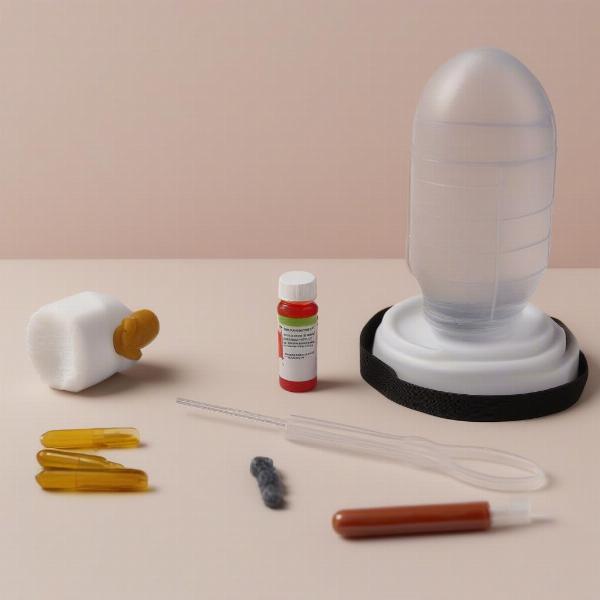Ticks are a common nuisance for dogs, transmitting diseases like Lyme disease, ehrlichiosis, and anaplasmosis. Choosing the best tick medicine is crucial for protecting your furry friend’s health. This article provides essential information to help you make an informed decision, covering various types of tick prevention, factors to consider, and answering frequently asked questions.
There are several types of tick medications available, each with its own pros and cons. Oral medications offer convenience, while topical treatments are easy to apply. Choosing the right one depends on your dog’s lifestyle, age, and health condition. We’ll delve into the specifics of each type, helping you navigate the options and select the most suitable tick preventative for your beloved pet.
Types of Tick Medicine for Dogs
Understanding the different types of tick medicine available is the first step to effective tick control. Here’s a breakdown of the common options:
Oral Medications
Oral tick medications are administered as chewable tablets or pills. They work systemically, killing ticks that bite your dog. Some popular choices include Bravecto, NexGard, and Simparica.
Topical Treatments
Topical treatments are applied directly to your dog’s skin, usually between the shoulder blades. These solutions spread over the skin and kill ticks on contact. Frontline Plus, K9 Advantix II, and Revolution are common examples.
Tick Collars
Tick collars release insecticide over time, providing continuous protection. Seresto and Preventic are well-known tick collar brands.
 Types of Tick Medicine for Dogs: Oral, Topical, and Collar
Types of Tick Medicine for Dogs: Oral, Topical, and Collar
Factors to Consider When Choosing Tick Medicine
Choosing the best tick medicine for your dog isn’t a one-size-fits-all approach. Several factors come into play:
- Age and Health: Puppies and senior dogs may have different sensitivities to certain ingredients. Always consult your veterinarian before using any tick medication on young or older dogs, or dogs with pre-existing health conditions.
- Lifestyle: A dog that frequently swims or is bathed will need a waterproof or water-resistant tick preventative. If your dog spends a lot of time outdoors, especially in wooded or grassy areas, a stronger and longer-lasting protection might be necessary.
- Cost: Tick medications vary in price. Consider your budget and the frequency of application when choosing a product.
- Geographic Location: The prevalence of ticks and the types of tick-borne diseases vary by region. Choose a product effective against the ticks common in your area.
How to Apply Tick Medicine Safely
Regardless of the type of tick medicine you choose, always follow the manufacturer’s instructions carefully. Here are some general safety tips:
- Wear gloves when applying topical treatments or handling tick collars.
- Wash your hands thoroughly after application.
- Observe your dog for any adverse reactions, such as itching, redness, or vomiting.
- Store tick medications safely away from children and pets.
Natural Tick Prevention Methods
While chemical tick preventatives are generally effective, some pet owners prefer natural alternatives. These options may offer less potent protection but can be used in conjunction with other methods:
- Regular Grooming: Brushing your dog’s coat regularly helps detect and remove ticks.
- Tick Repellent Sprays: Natural tick repellent sprays containing essential oils like citronella, lavender, and eucalyptus can offer some protection.
- Maintaining a Tick-Free Yard: Keeping your lawn mowed short and removing leaf litter can help reduce tick populations in your yard.
“Keeping your dog’s environment tick-free is just as important as applying preventative medication,” advises Dr. Emily Carter, DVM, specializing in canine parasitology. “Regular yard maintenance and grooming are crucial for comprehensive tick control.”
Conclusion
Protecting your dog from ticks is essential for their health and well-being. Choosing the best tick medicine involves considering your dog’s individual needs and lifestyle. By understanding the different types of tick preventatives and following safe application practices, you can help keep your furry friend tick-free and healthy. Always consult your veterinarian for personalized recommendations and to discuss any concerns you may have.
FAQ
- How often should I apply tick medicine to my dog? The frequency of application varies depending on the product. Some medications last for a month, while others provide protection for several months.
- Can I use dog tick medicine on my cat? No, never use dog tick medicine on a cat. Many dog tick medications contain permethrin, which is toxic to cats.
- What should I do if I find a tick on my dog? Remove the tick promptly using tweezers, grasping it as close to the skin as possible. Clean the area with antiseptic and monitor for any signs of infection.
- Are there any side effects of tick medicine? Some dogs may experience mild side effects such as itching, redness, or gastrointestinal upset. If you notice any severe or persistent side effects, contact your veterinarian immediately.
- Can I use multiple tick prevention methods at the same time? It’s best to consult with your veterinarian before combining different tick prevention methods.
- What are the signs of tick-borne illness in dogs? Signs of tick-borne illness can vary but may include fever, lethargy, loss of appetite, joint pain, and swollen lymph nodes.
- How can I prevent ticks in my yard? Regularly mow your lawn, remove leaf litter, and create a barrier of wood chips or gravel between your yard and wooded areas.
Related Articles:
About ILM Dog:
ILM Dog is your trusted international resource for comprehensive dog care information. We offer expert advice on a range of topics, including breed selection, health and medical care, training, nutrition, grooming, and product recommendations. Whether you’re a seasoned dog owner or a new pet parent, our goal is to provide you with the knowledge and resources you need to ensure your dog’s health and happiness. For personalized guidance or inquiries, connect with our experts at [email protected] or call us at +44 20-3965-8624. Learn more at ILM Dog.